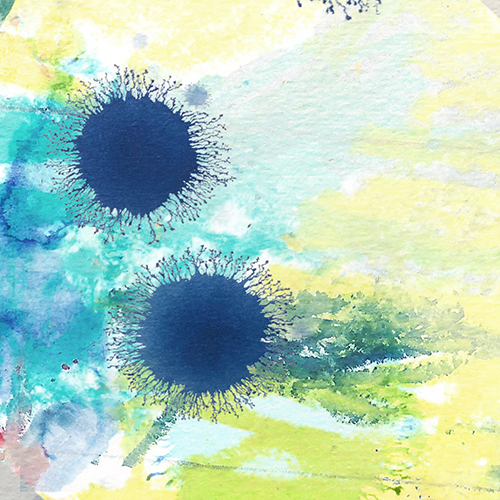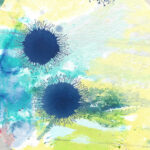Another Place
Short Story
by Jackie Taylor
‘The Council have given us notice. I tried, but… ’ She couldn’t continue, and anyway, she had nothing material to add. C remained exactly where he was, staring out of the metal framed window towards the sea. He didn’t ask – so what now, or how long have we got, or even why. He couldn’t ask. It would have been so much easier for her if they could have had a discussion or made a plan. But C no longer had the ability to synthesise speech. A bead of condensation settled on the aluminium ridge above his cheekbone, and she wiped it away before it had a chance to fall.
Dusk settled slowly over the rusty garden furniture scattered across the lawns. A tractor crawled along their boundary, headlights on, hard-flailing the hedges and throwing shredded sycamore and hawthorn up into the air. It was early spring, too close to the nesting season really for winter cutting, and she wondered about the beetles and the ladybirds, and how much progress the swallows had made on their journey from Africa.
She’d driven back from the Council office in town too fast, disorientated by patches of fog on the coast road and the sick emptiness that replaced the adrenalin of the meeting. She’d almost missed the iron gates and had to turn in sharply, her wheels spitting gravel. The building, an unlisted Edwardian villa, was unlit. It wore its history on its sleeve; block-built extensions, fire doors, and metal fire escapes revealed its progression from merchant-built family home, through wartime hospital, to old people’s home, to hospice, its most recent use. A flimsy lean-to ran the width of the building, still lined with wipe-down wing chairs from the days when patients nodded in the sunshine while their visitors enjoyed the view. As she pulled up in front of the building, she looked up, knowing that C would be waiting where she’d left him, in front of the window, lined up with his brothers.
The Chairman had said, ‘Our agreement was for temporary use only. Until due diligence was done and dusted, and finance in place – so next week, no later.’ She’d negotiated two weeks, exaggerating how much stuff there was to move. She was shown a 3D model of the new development. The words swirled: luxury apartments, penthouse suites, underground garaging, prime location, aspirational, lock-up-and-leave, swimming pool, restaurant, 24-hour concierge. She was given little time to speak. ‘Place gives me the creeps,’ the Chairman said, walking his fingers through the 3-D model’s high security gates and along the artist’s impression of a herringbone brick driveway. ‘The sooner it’s brought back into proper use, the better.’
More water had beaded on C’s face, something he’d been prone to since she’d cleaned away the remains of his velvety skin with sugar soap to reveal the sculpted metal beneath. With the perished beige fabric and glue removed, his face held the soft silver glow of moonlight. Stripped of tell-tale skin, a hint of oxidisation beneath the small emergency solar array across his forehead was visible.
‘You mustn’t be scared,’ she whispered. ‘I’ll be with you, I promise. I’ll hold your hand. We’ll sing.’ She knew the reality of it; they couldn’t carry on like this. She knew that C was existing on stand-by power only. All the main batteries had been removed from the brothers when the hospice closed. But still, there was that final shutdown to face – the recovery of wiring, the sorting, the stripping, the picking over of C’s frame. Those final, irreversible steps. He had served. They all had. They deserved more than being dismembered and dumped into a furnace without ceremony or thanks.
C had cared for her husband John in a way that she could not. When she had nothing but left-over love for the man he’d been, when she had nothing to offer but anger and frustration and guilt, C had sat with John. In the early days, he helped John identify birds and record them in has log. Later, C had read to him, picked up the things he dropped, found his glasses, held the beaker to his lips, patiently, gently, lovingly. When she visited, she often found them singing in the sunroom. C provided the soundtrack, identifying tunes based on John’s tentative humming. Simon and Garfunkel had been their favourite. She had been so relieved to be so excluded.
For John’s final two days, she had sat on one side of the bed, while C sat on the other. She dozed. C stayed alert. C was able to mould his hand to fit exactly over John’s, cold steel against burning skin. She would love him for ever for that.
Now C was lined up with his brothers, twenty-six of them in total, like tin soldiers, looking out towards the horizon. Would it have been easier if they hadn’t been given kind eyes that flashed with joy, or skin that was soft to the touch, or voices that could sing? When the hospice closed, she had moved in to care for them. Twenty-six figures standing in the window to bear witness, to stand as testament, to ask a question about debt and gratitude. None of them had enough power left to move themselves, or to respond to her commands. And now the vigil was over. The Council’s contractors would arrive in two weeks.
In one of the outbuildings, she found an old sack trolley. There were steps and the terraces to negotiate, but she managed to wheel the first of the brothers out onto the lawn, his head resting over her shoulder. She positioned him, her practice piece, amongst the reeds by the choked-up pond. Over the next days, she placed the rest of the brothers around the gardens amongst the nettles and bramble, the bracken and the gorse. She sat them in rusty metal chairs as if they were about to take tea, on a swing-seat, in the middle of what had been the croquet lawn. Playing its part in the installation, the weather veered between torrential rain and dismal, settled fog. She photographed everything.
She left C until last, arranging and rearranging the brothers and documenting her process until she could put it off no longer. She wheeled him down the drive, her trolley sinking lopsidedly into the uneven gravel, then out of the gates and across to the cliff edge. She wedged him against an outcrop of lichen-covered granite, with tiny shiverings of last season’s thrift beside him and the full spread of the sea at his feet.
She sat with him for two days, as he had sat with John at the end, her hand moulded over his, cold skin against cold metal. She hummed hymns from her childhood, and Simon and Garfunkel’s greatest hits, and recited shards of poems she’d learned by heart at school. She let the mist and rain settle on him and run in rivulets down his face. She watched gannets dive-bombing, and cormorants slicing like arrows above the waves, and she wondered how much progress the swallows had made on their journey from Africa.
The weather cleared and delivered a faint sunrise with enough energy for a final power down. While she slept, the emergency solar array across C’s forehead caught the cool sunlight, and he opened his mouth as if to sing.

About the Author
Jackie Taylor is a writer of poetry, short fiction, and hybrid things who lives and works in Cornwall. Her short story collection, Strange Waters, was published in 2021 by Arachne Press. She holds a Masters degree in Creative Writing from the University of Glasgow. Visit Jackie’s website or follow her on Twitter.


